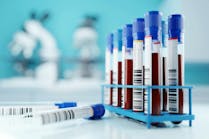Scientists have completed a deep analysis of the proteins driving cancer across multiple tumor types, information that can’t be assessed by genome sequencing alone. Understanding how proteins operate in cancer cells raises the prospect of new therapies that block key proteins that drive cancer growth, or therapies that trigger immune responses to abnormal proteins created by cancer cells.
Led by Washington University School of Medicine in St. Louis, the Broad Institute of MIT and Harvard, Brigham Young University and other institutions around the world, the Clinical Proteomic Tumor Analysis Consortium investigates key proteins driving cancer and how they’re regulated.
The findings are published Aug. 14 in a set of papers in the journals Cell and Cancer Cell.
The researchers analyzed about 10,000 proteins involved in 10 different types of cancer. Ding emphasized the importance of the sheer volume of data in this type of analysis; many of these important cancer-driving proteins are rare in any single cancer and could not have been identified had the tumor types been studied individually. The analysis included two different types of lung cancer as well as colorectal, ovarian, kidney, head and neck, uterine, pancreatic, breast and brain cancers.
Beyond the function of individual proteins, such data also allow the researchers to understand how proteins interact with one another to fuel cancer growth. If the levels of two proteins correlate with one another — for example, when one is present at high levels and the other always is as well — this can indicate that the two proteins act as partners. Disrupting the interaction may be a promising way to block tumor growth.
The studies, including one co-led by Ding and Gad Getz, PhD, of the Broad Institute, also revealed different ways proteins can be chemically altered to change their function. The researchers documented how such chemical changes — processes called acetylation and phosphorylation — can alter DNA repair, change immune responses, and modify how DNA is folded and packaged, among other important molecular changes that can play roles in driving cancer.
The research also shed light on the effectiveness of immunotherapies. Immunotherapies such as checkpoint inhibitors often work best in cancers with a lot of mutations, but even then, they don’t work for all patients. The researchers found that high numbers of mutations don’t always result in an abundance of abnormal proteins, which is what the immune system targets when attacking a tumor.
In another study, Ding’s team identified patterns of DNA methylation, another chemical alteration that can influence the way genes are expressed. Such patterns can be key cancer drivers. In one important finding, the team identified a molecular switch that suppresses the immune system in certain tumor types.
The final paper in the set of four studies makes the data and analysis resources used by the consortium available to the wider research community.





